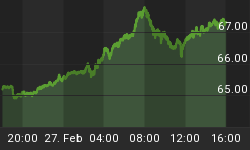We look at all cyclical companies trying to decipher what a "mid-cycle" earnings stream might be. For instance, let's say an auto maker (the classic cyclical) is trading at 20 times trough earnings. Another cyclical, a tractor company is trading at 10 times peak earnings. In the perverse world of cyclicals, the stock at 20x trough earnings might actually be cheaper than the stock at 10x earnings. The question then is what percentage of the time does the company produce peak or trough earnings and what is the peak to trough range?
To make this simple, let's say the automaker above makes either $1 or $3 every other year, such that the average is $2 in mid-cycle earnings. With the stock trading at 20x trough earnings or 20 bucks it is in reality trading at trading at 10x mid-cycle earnings. Meanwhile the tractor company also earns either a $1 or $3 every other year, such that mid-cycle earnings are $2. With the tractor stock trading a 10x peak earnings of $3 or 30 bucks it is in reality trading at 15x mid-cycle earnings. The stock trading at the higher multiple is actually cheaper because of where it is in an earnings cycle.
Now, our example was too simple in that knowing what percentage of the time a stock will have peak or trough earnings or somewhere in between is not possible. However, reasonable estimations must be made at mid-cycle earnings with cyclicals or else one will make the mistake of buying at low multiples of peak earnings and miss the bargains with seemingly higher multiples on trough earnings. Below we have applied this example to our theoretical XYZ gold company so one can see how earnings might change and a mid-cycle earnings estimate might be arrived at. In practicality, the analysis can become much more complicated, but the thing to remember is that gold (like other commodities) has peaks and valleys and estimating what percent of the time will be spent at each and where one is in that range is crucial. This is what allowed one to buy metals stocks in 2000 when earnings were poor on the surface. A long-term industry veteran knew that the earnings could expand greatly, thus making high P/Es shrink to reasonable or cheap P/Es.

As with all things we build in a margin of safety, assume everything will turn out far worse than is likely and, if a miner still looks cheap, then perhaps you are on to something.
Finally, notice we didn't dive into analyzing drill results. More power to those who want to study initial drill findings and try to extrapolate the value of such findings, but that is simply too speculative an endeavor for us. We will always opt for producing mines with a proven track record and still meaningful mine lives that are run by management that has a solid history of conservatism.
We feel if you apply these principles to the mining stocks, that very few will measure up - making it easier to hand pick a basket of producers you are comfortable with. This discipline is key, so that during scary corrections one is not shaken out before the next leg up.
more follows for subscribers . . .















